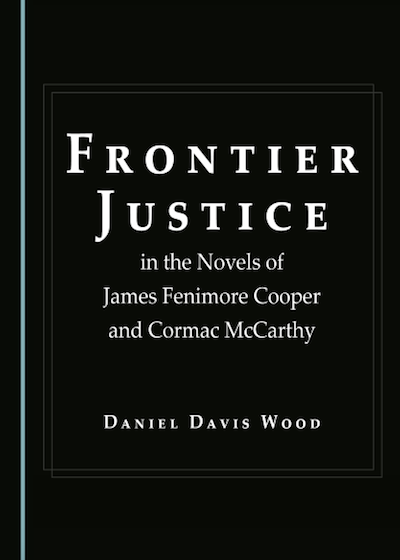My monograph, Frontier Justice in the Novels of James Fenimore Cooper and Cormac McCarthy was published by Cambridge Scholars Press in 2016.
- Read the Introduction and beginning of Part I.
- Read the preview at Google Books.
- Purchase a print copy through Amazon or CSP.
Frontier Justice focuses on two of the most celebrated and influential writers of the American West. Both have written powerful narratives that focus on the disappearance of the nineteenth century frontier, and both show an interest in the dramatic ways in which the frontier gave shape to American culture. But is it possible that the kinship between these two writers extends beyond simply sharing an interest in this subject? Teasing out the implications of the recurrent allusions to Cooper’s Leatherstocking Tales in the pages of McCarthy’s Southwestern novels, Frontier Justice finds Cooper and McCarthy engaged in a complex legal and ethical dialogue despite the centuries that separate their lives and their work. The result of their dialogue is a provocative, nuanced analysis of the effects of the frontier on the American justice system — and, for both writers, an expression of alarm at the violation of the principles upon which the system was established.
Praise for Frontier Justice
[Frontier Justice] impresses in its prodigious groundwork and its meticulous attention to the literary and critical appraisals of both Cooper and McCarthy. It is an excellent starting point for a discussion of American popular culture and literature in the nineteenth and twentieth centuries, and of the continued existence of the frontier myth and its place in American jurisprudence. It provides a significant contribution to James Fenimore Cooper and Cormac McCarthy scholarship, developing a valuable resource for future scholars of the works of both these authors.
— Signe O. Wegener
author of James Fenimore Cooper Versus the Cult of Domesticity
[Frontier Justice] is a remarkable accomplishment, affirming the historical value of artistic expression and literary criticism as an enlightened instrument of ethics. It offers a new understanding of Cooper’s continuing significance [and his attempts to] constitute an American myth around a principle of justice that is at once arcane and of global significance. It also illuminates an ongoing debate in McCarthy studies, confirming that McCarthy’s work is centered on a deep sense that the ethical sphere is worth seeking and, through art, preserving.
— Steven Frye
author of Understanding Cormac McCarthy
